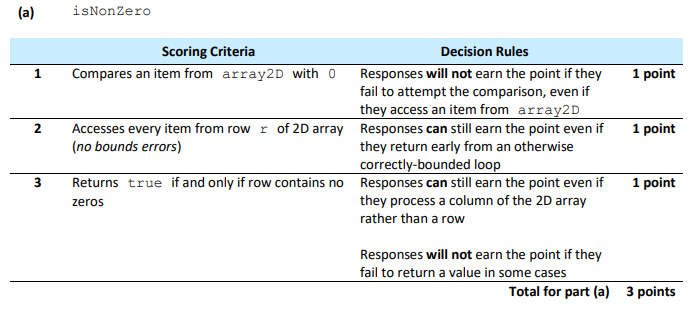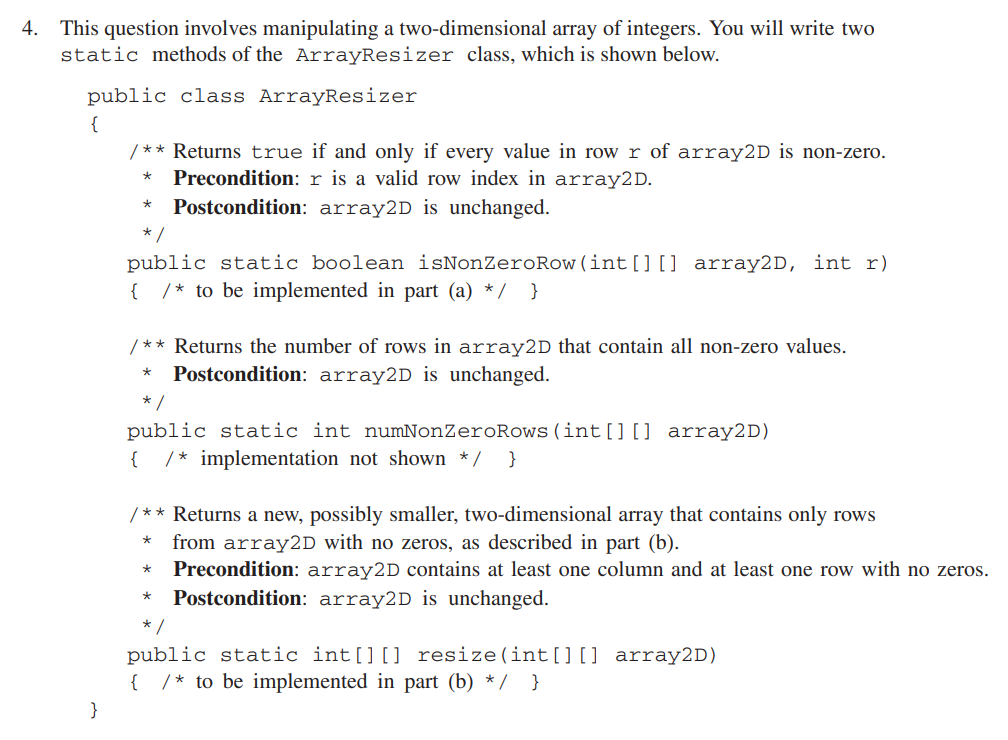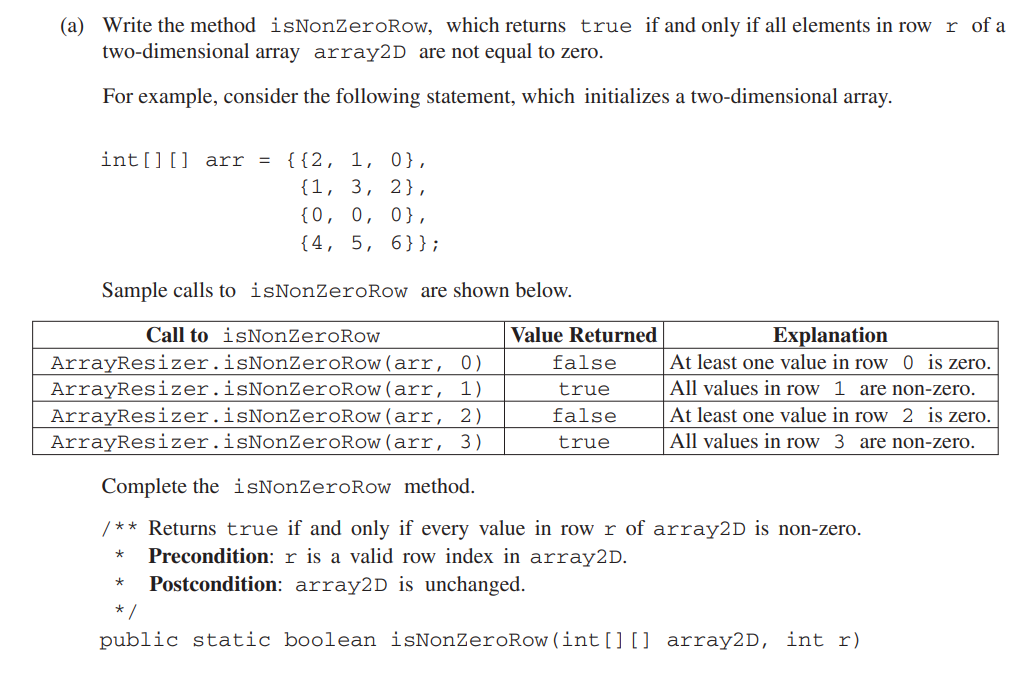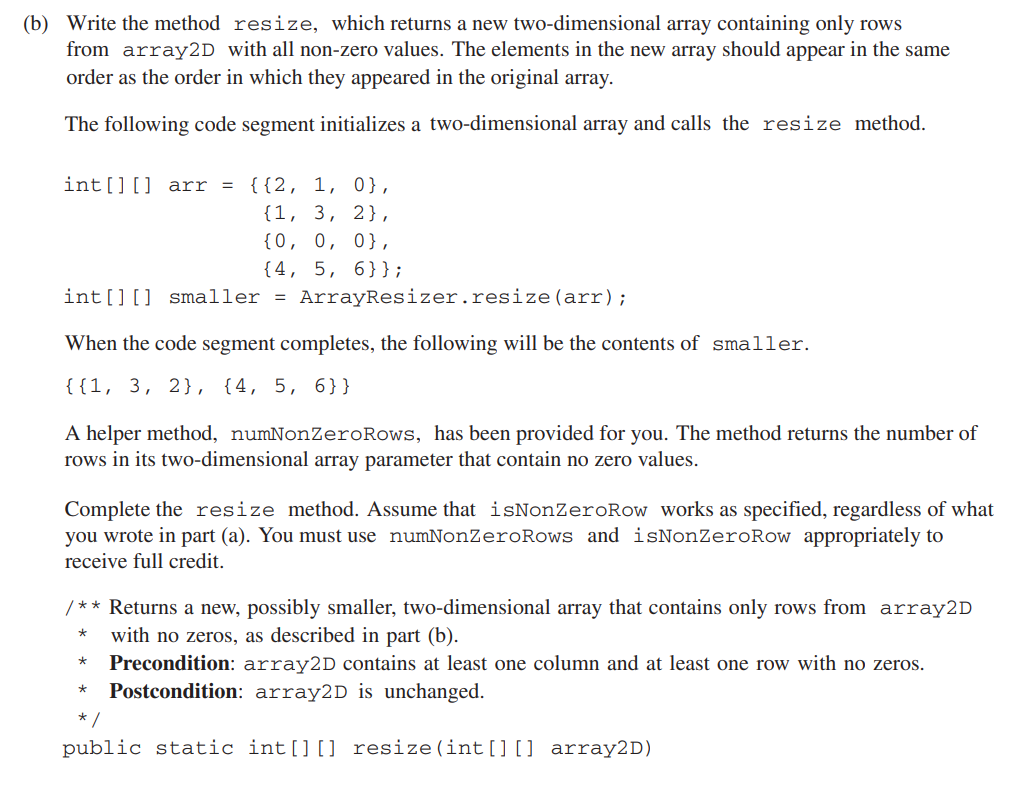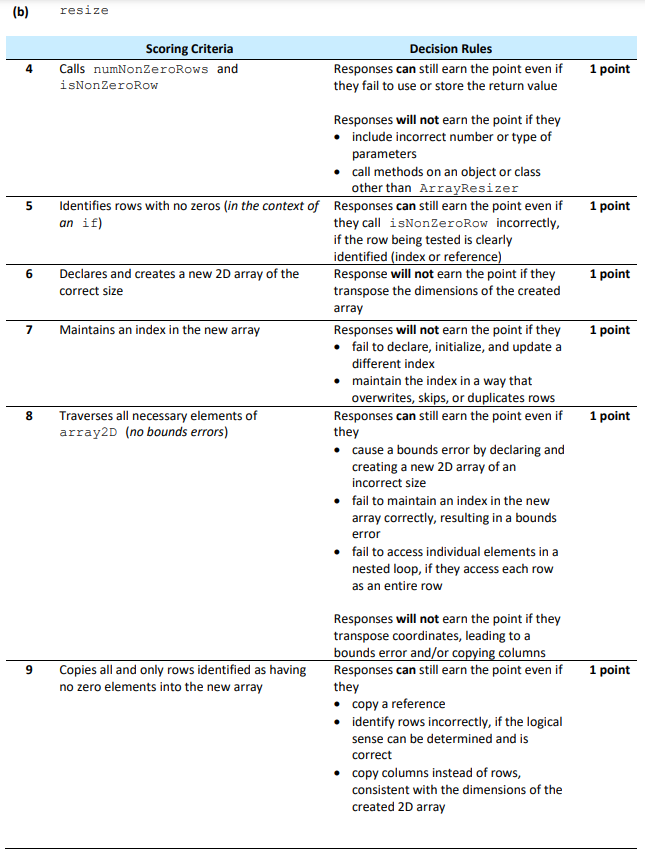Color Matrix

Common Questions
2D Array Initialization:
- Declaring and instantiating two-dimensional arrays.
- Assigning values to specific rows and columns.
2D Array Traversal:
- Using nested loops to navigate through rows and columns.
- Accessing and modifying individual elements using indices.
Conditional Checks in 2D Arrays:
- Searching for specific values or patterns in the array.
- Implementing conditions to check rows or columns with certain characteristics.
Methods Involving 2D Arrays:
- Passing 2D arrays as method parameters.
- Returning 2D arrays from methods.
Variable Scope in 2D Arrays:
- Differentiating between local variables within methods and instance variables of the class.
- Understanding the lifecycle of variables within loops and methods.
Resizing and Copying 2D Arrays:
- Creating new arrays based on certain conditions from existing arrays.
- Implementing deep copy and shallow copy for 2D arrays.
Common Patterns and Problems:
- Finding the sum or average of elements in rows or columns.
- Rotating or flipping the 2D array.
- Checking for diagonal, horizontal, or vertical patterns.
Topics Covered
- 2D Array Traversal:
- Understanding how to navigate through the rows and columns of a 2D array.
- Using nested loops to access individual elements.
- Conditional Checks:
- Evaluating conditions within the 2D array.
- Making decisions based on the values of elements.
- Array Resizing:
- Dynamically creating new arrays based on conditions from existing arrays.
- Preserving data integrity while resizing.
AP CSA Exam 2021: Problem 4
Question 4 Part A
class arrayResizer {
public static boolean isNonZeroRow(int[][] array2D, int r) {
for (int j = 0; j < array2D[r].length; j++) {
if (array2D[r][j] == 0) {
return false;
}
}
return true;
}
public static void main (String[] args) {
int[][] arr = {
{2, 1, 0},
{1, 3, 2},
{1, 8, 0},
{4, 5, 6}
};
System.out.println(arrayResizer.isNonZeroRow(arr, 1));
System.out.println(arrayResizer.isNonZeroRow(arr, 2));
}
}
arrayResizer.main(null);
true
false
Method: isNonZeroRow
Description
This method checks if all elements in a specified row of a 2D array are non-zero.
Parameters
array2D: The two-dimensional array to check.r: The index of the row to check.
Return Value
- Returns
trueif all elements in the row are non-zero. - Returns
falseotherwise.
Implementation Details
- A loop traverses each column of the specified row.
- Within the loop, there’s a conditional check for each element.
- If any element in the row is zero, the method immediately returns
false. - If the loop completes without finding a zero, the method returns
true.
Question 4 Part B
class arrayResizer {
// Checks if a given row 'r' in the 2D array 'array2D' has all non-zero elements.
public static boolean isNonZeroRow(int[][] array2D, int r) {
for (int j = 0; j < array2D[r].length; j++) {
// If any element in the row is zero, return false.
if (array2D[r][j] == 0) {
return false;
}
}
// If all elements in the row are non-zero, return true.
return true;
}
// Counts and returns the number of rows in the 2D array 'array2D' that have all non-zero elements.
public static int numNonZeroRows(int[][] array2D) {
int count = 0;
for (int i = 0; i < array2D.length; i++) {
// If the row has all non-zero elements, increment the count.
if (isNonZeroRow(array2D, i)) {
count++;
}
}
return count;
}
// Returns a new 2D array that contains only the rows from 'array2D' that have all non-zero elements.
public static int[][] resize(int[][] array2D) {
// Get the number of rows that have all non-zero elements.
int nonZeroRowCount = numNonZeroRows(array2D);
// Create a new 2D array with the size of non-zero rows.
int[][] resizedArray = new int[nonZeroRowCount][];
int index = 0;
for (int i = 0; i < array2D.length; i++) {
// If the row has all non-zero elements, add it to the new 2D array.
if (isNonZeroRow(array2D, i)) {
resizedArray[index] = array2D[i];
index++;
}
}
return resizedArray;
}
// Checks if a given row 'r' in the 2D array 'array2D' has all elements in ascending order.
public static boolean isAscendingRow(int[][] array2D, int r) {
for (int j = 1; j < array2D[r].length; j++) {
if (array2D[r][j-1] > array2D[r][j]) {
return false;
}
}
return true;
}
// Returns a new 2D array that contains only the rows from 'array2D' that have elements in ascending order.
public static int[][] resizeBasedOnOrder(int[][] array2D) {
int ascendingRowCount = 0;
for (int i = 0; i < array2D.length; i++) {
if (isAscendingRow(array2D, i)) {
ascendingRowCount++;
}
}
int[][] resizedArray = new int[ascendingRowCount][];
int index = 0;
for (int i = 0; i < array2D.length; i++) {
if (isAscendingRow(array2D, i)) {
resizedArray[index] = array2D[i];
index++;
}
}
return resizedArray;
}
public static void main (String[] args) {
int[][] arr = {
{2, 1, 0},
{1, 3, 2},
{1, 8, 0},
{4, 5, 6}
};
int[][] resizedArr = arrayResizer.resize(arr);
int[][] resizedOnOrderArr = arrayResizer.resizeBasedOnOrder(arr);
//looping through the rows, then columns of the 2D array, and printing the values out
for (int i = 0; i < resizedArr.length; i++) {
for (int j = 0; j < resizedArr[i].length; j++) {
System.out.print(resizedArr[i][j] + " ");
}
System.out.println();
}
System.out.println();
//same thing, but this time for the one we resized based on ascending rows
for (int i = 0; i < resizedOnOrderArr.length; i++) {
for (int j = 0; j < resizedOnOrderArr[i].length; j++) {
System.out.print(resizedOnOrderArr[i][j] + " ");
}
System.out.println();
}
}
}
arrayResizer.main(null);
1 3 2
4 5 6
4 5 6
Method: resize
Overview
The resize method is designed to filter out rows in a 2D array that contain any zero values. The method returns a new 2D array that only includes rows with non-zero values.
Parameters
- array2D: A two-dimensional array that serves as the input.
Return Value
- A new 2D array containing only rows from the original
array2Dthat have all non-zero values.
Implementation Details
- Determine Non-Zero Rows: The method first calculates the number of rows in the original array that consist entirely of non-zero values.
- Initialize New Array: A new 2D array is created with a number of rows equivalent to the count of non-zero rows from the original array.
- Copy Non-Zero Rows: The method then iterates through each row of the original array. If a row is identified as having only non-zero values (using the
isNonZeroRowhelper method), it’s copied to the new array. - Return Resized Array: The new 2D array, now containing only non-zero rows, is returned.
Feedback
1/1
- Add a method that resizes the array on another condition, like the order of the integers
